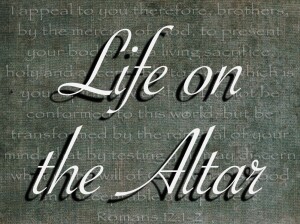Take My Life and Let It Be
Written by Pastor Jim Law, Posted in Church Life, Devotional
 Reading the regiment of sacrifices in the books of Leviticus and Numbers can be a tough go. I don’t think anyone is ever tempted to want to return to the “good old days” after reading this section of Scripture. Every year I am reminded of this in my annual Bible reading, but please don’t hear a bad attitude with regard to these Bible books. They are after all, God’s holy word, and they are written “for our instruction, that through endurance and through the encouragement of the Scriptures we might have hope.” (Romans 15:4) I find myself thanking God as I trek through these tedious details in the books of the Law. With each repetition and requirement, my gratitude is centered on the fact that Christ has fulfilled that old system in substance and with full atonement, realities the Law only symbolized. I am thankful that his once-for-all death purchased redemption in full. No, there will never be another sacrifice than that which is found in Christ alone.
Reading the regiment of sacrifices in the books of Leviticus and Numbers can be a tough go. I don’t think anyone is ever tempted to want to return to the “good old days” after reading this section of Scripture. Every year I am reminded of this in my annual Bible reading, but please don’t hear a bad attitude with regard to these Bible books. They are after all, God’s holy word, and they are written “for our instruction, that through endurance and through the encouragement of the Scriptures we might have hope.” (Romans 15:4) I find myself thanking God as I trek through these tedious details in the books of the Law. With each repetition and requirement, my gratitude is centered on the fact that Christ has fulfilled that old system in substance and with full atonement, realities the Law only symbolized. I am thankful that his once-for-all death purchased redemption in full. No, there will never be another sacrifice than that which is found in Christ alone.
When the Apostle Paul issues the call for believers to present their bodies as “a living and holy sacrifice, acceptable to God, which is your spiritual service of worship,” (NASB) he was using temple language which takes us to the sacrificial offerings under the old covenant. Paul was not seeking to restart the old sacrificial system, nor was he hinting at a personal payment for one’s sins, which could never be done. The old system has indeed passed away. A point the writer of Hebrews presses as a major theme of the book, “In speaking of a new covenant, he (God) makes the first one obsolete. And what is becoming obsolete and growing old is ready to vanish away.” (Hebrews 8:13)
However, we find in Romans 12 that there still is a New Testament sacrificial system. According to R.C. Sproul, “It is not a sacrifice that we give in order to make an atonement, but a sacrifice that we give because an atonement has been made for us. God does not ask us to bring in our livestock and burn it on the altar; he asks us to give ourselves, to put ourselves alive on the altar. To be a Christian means to live a life of sacrifice, a life of presentation, making a gift of ourselves to God.” The motivation to live such a life is always as an expression of gratitude for God’s mercies found in Christ. He has done salvation’s work, all to him we owe.
J. I. Packer in Rediscovering Holiness writes, “The secular world never understands Christian motivation.” Often Christianity is perceived as purely a quid-pro-quo relationship with God. In other words, Christians are in it for the goodies, the blessings, which motivate them to do what they do. To which we would respond that certainly God’s blessings are given to every believer in Jesus, and that these blessings bring joy to our lives. (John 15:11) In Christ, we have been blessed with “every spiritual blessing in the heavenly places.” (Ephesians 1:3) In Jesus Christ, we have entered a relationship with God in which “no eye has seen, nor ear heard, nor the heart of man imagined, what God has prepared for those who love him.” (I Corinthians 2:9) But with regard to our ultimate motivation, Packer helps clarify, “From the plan of salvation I learn that the true driving force in authentic Christian living is, and ever must be, not the hope of gain, but the heart of gratitude.” Followers of Jesus Christ are to be a people overflowing with gratitude to God for his abundant grace and mercy upon their lives. (more…)